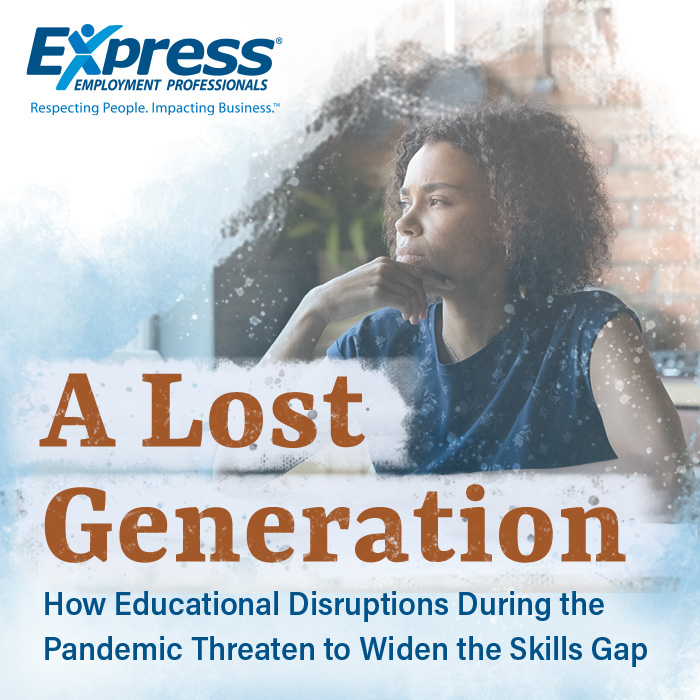Lost Generation: Pandemic School Closures Could Make Canada’s Skills Gap Much Worse
TORONTO - October 13, 2021

Lost Generation: Pandemic School Closures Could Make Canada's Skills Gap Much Worse
Vast Majority of Canadians Say Students Affected by School Disruptions Won't Have Skills Employers Need
New White Paper Provides In-Depth Analysis of Consequences of School Disruptions on Canada's Economy
Long before the COVID-19 pandemic began, employers were ringing the alarm on the growing disconnect between the skills needed for the jobs of today and the future and what students are learning at school. Then, the COVID-19 pandemic caused the closure of schools, leading to more than a year and a half of on-again-off-again remote learning. As a result, the problem of skill shortages already threatening Canada's economy has now become an even more dire situation.

Canadians are very worried about the consequences of school disruptions, and more than 4 in 5 (82%) think a "lost generation of students"-a generation that does not have all the skills necessary to be successful in the workforce-will be a problem for employers in Canada. What's more, more than 4 in 10 Canadians (43%) do not think Canada is taking the right steps to help students recover and adjust to the pandemic disruptions. This is according to a new survey by The Harris Poll, commissioned by Express Employment Professionals.
The results of the survey, as well as the long-term personal, professional, mental and financial ramifications of remote learning for students and companies, are explored in a new white paper out today from Express Employment Professionals:
"A Lost Generation: How Pandemic School Closures and Remote Learning Threaten to Widen the Skills Gap."
"The disruptions to education will mean a whole generation or more is falling further behind," Express CEO Bill Stoller said. "Getting back to the pre-pandemic status quo won't be enough, and Canadians are in general agreement that we're witnessing the creation of a 'lost generation.'"
The survey also found nearly 8 in 10 (78%) of Canadians say school disruptions will pose long- and short-term challenges to young people's performance at school and in their future workplaces. In addition, most Canadians say that there are a range of other negative impacts that will impact students affected by school disruptions:
- 81% say it harms their ability to socialize with others
- 81% say it is harming their mental health
- 77% say it is hurting development of hard skills
- 76% say it is hurting development of soft skills
Two-thirds (66%) of Canadians agree that the emergence of a lost generation of students combined with the rapid retirement of Baby Boomers means Canada's "workforce is in trouble."
Beyond the implications for students and employers, the ripple effects of disrupted education are predicted to be a drag on economic growth for a generation-if lawmakers, employers and educators do not act swiftly to rethink and improve the education system, not just in the short term but for the long haul.
Other highlights of the white paper include:
- School closures creating domino effects that further strain the workforce
- Minority and disadvantaged students hardest hit
- Disruption today means lost earnings tomorrow-and lost GDP
- Parents concerned about mental health and other behaviors in their children
- Accelerating the pre-existing demographic crisis
- Fixing the problem
"The start of this new school year is an inflection point with big implications in the coming years," Stoller said.
"Intervention now is imperative to save this 'lost generation' and the good news is it's not too late. Change will take a concerted effort by many entities, but it's well worth the investment."
Survey Methodology
The survey was conducted online within Canada by The Harris Poll on behalf of Express Employment Professionals between August 4 and August 9, 2021, among 1,088 Canadian adults ages 18 and older. Data were weighted where necessary by age by gender, education, region, race, household size, marital status, and language to bring them into line with their actual proportions in the population. This online survey is not based on a probability sample and therefore no estimate of theoretical sampling error can be calculated.
- Memo from The Harris Poll
- Study
###
If you would like to arrange for an interview to discuss this topic, please contact Ana Curic at (613) 858-2622 or email Ana@MapleLeafStrategies.
About Bill Stoller
William H. "Bill" Stoller is chairman and chief executive officer of Express Employment Professionals. Headquartered in Oklahoma City, Oklahoma, the international staffing company has more than 830 franchises in the U.S., Canada, South Africa, Australia and New Zealand. Since inception, Express has put more than 9 million people to work worldwide.
About Express Employment Professionals
At Express Employment Professionals, we're in the business of people. From job seekers to client companies, Express helps people thrive and businesses grow. Our international network of franchises offers localized staffing solutions to the communities they serve across the U.S., Canada, South Africa, Australia and New Zealand, employing 526,000 people globally in 2020. For more information, visit
www.ExpressPros.com.